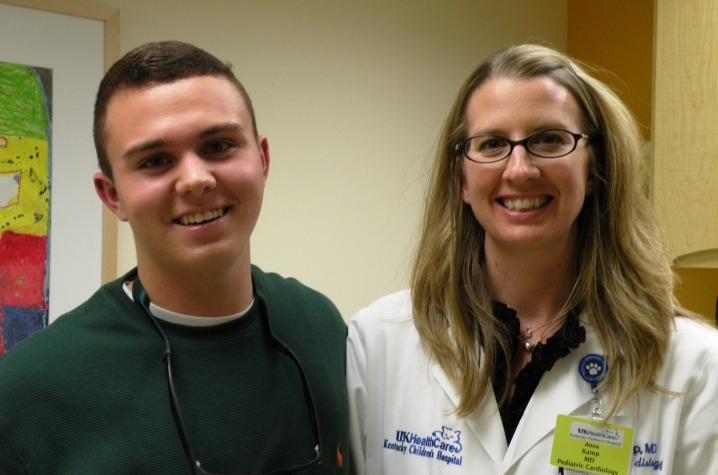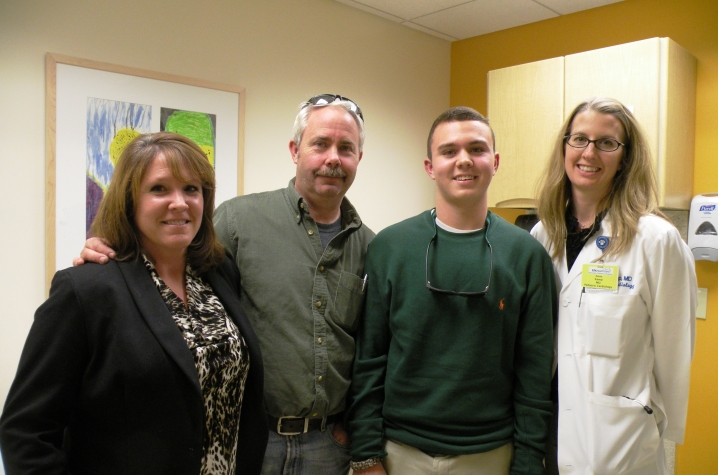UK Pediatric Heart Patient and Athlete Embraces A New Sport After Sudden Cardiac Arrest
LEXINGTON, Ky. (Jan. 3, 2013) – Fifteen-year-old UK patient Ben Highland is looking forward to playing golf for his high school – an opportunity that wouldn’t have been possible without the quick intervention and teamwork of both good Samaritans and his medical team.
On Feb. 6, 2012, Ben suffered a sudden cardiac arrest (SCA) and collapsed at the end of his baseball practice at Lafayette High School in Lexington. An SCA occurs when blood flow stops due to the heart failing to contract properly – and when these rare incidents happen, immediate treatment is necessary for the patient to have any chance for survival.
Jenni Williams, the UK Sports Medicine athletic trainer assigned to Lafayette, was at the practice and used a defibrillator on Ben. A local nurse – who just happened to be out walking with her husband and witnessed the incident – stopped to provide CPR assistance until paramedics arrived.
Ben was taken to UK Albert B. Chandler Hospital and placed on life support. He eventually stabilized, though he remained unconscious for several days.
“Initially, it was just a waiting game,” said Roy Highland, Ben’s father. “[The doctors] said that ‘things look great, he’s doing good, but we don’t know – we can’t really say that he’s going to be okay.’”
It was an incredibly scary and trying time for the family and friends of the previously perfectly healthy young athlete. “I had a doctor tell me that I had a two percent chance of my son surviving, and a two percent chance of me having my son as I knew him,” said Carey Highland, Ben’s mother. “So they kind of prepared you for the worst… but I never gave in.”
When Ben finally woke up, his initial memory loss and hallucinations worried his parents.
“He would associate things that were normal for him with things that were abnormal,” Roy said. “So he thought, at one point, that he was on a train, and we were going to a baseball game, and he was worried he didn’t have his uniform with him… he was very agitated.”
Those days were fraught with worry and tension – Ben was awake, but would he be able to fully recover both physically and mentally?
But on the fourth day in, he began regaining his bearings, Carey says. “We all took a sigh of relief – ‘he finally realizes where he is!’”
Ben himself remembers little of the incident or its aftermath.
“I really don’t remember anything – people tell me stuff, so I think I remember it,” Ben said. “But I don’t really know.”
He spent 12 days at Kentucky Children's Hospital, and then stayed home for only a week before returning to school. In the 10 months since the incident, life has slowly normalized. He has been cleared to play sports, albeit with some restrictions – he can’t lift extremely heavy weight or let his heart rate get too high, and he has to avoid activities that could potentially involve heavy physical contact, due to the implantable cardioverter defibrillator (ICD) in his chest.
The ICD is a small device that uses electrical pulses to help control life-threatening arrhythmias – if Ben’s heart develops an abnormal rhythm again, the ICD will deliver a shock to ‘reset’ his rhythm.
Though baseball had always been his sport of choice, since the incident Ben says he’s lost interest in pursuing that particular extra-curricular activity.
“I never got that definite answer, ‘No more baseball,’” Ben says. “But I had so many restrictions, it just wasn’t fun anymore.”
It was then that Ben’s grandfather suggested he take up a new sport, one that didn’t have so many restrictions – golf. Though Ben was initially reluctant, he decided to give it a try and began taking lessons twice a week – and discovered that he really liked it. He’s been working on his game since July and plans to put in some serious practice over the winter so that he can try out for the golf team at Henry Clay High School.
Though he’s only been playing since mid-summer, Ben says he feels confident about his ability to master the sport.
“I’m already a lot better than I used to be,” he said.
Meanwhile, Ben’s doctors are working on determining a conclusive diagnosis for what caused Ben’s SCA. His heart is healthy and structurally sound, according to UK pediatric electrophysiologist Dr. Anna Kamp, who sees Ben on a regular basis.
“His heart, by imaging studies, is completely normal,” Kamp says. “So we think he may just have an abnormality in the electrical conduction system of his heart, which is sometimes harder to define and give a diagnosis to. But the benefit of that, at least for him, is that his heart muscle function is good and quite normal.”
Despite what he’s been through – and the possibility of future SCAs that will require a shock – Ben maintains a positive outlook. He continues to attend school and his golf lessons and tries to lead as normal of a life as possible. He and his parents also make a point to try to visit other young SCA patients in the hospital, just to offer some comfort and support to others who are experiencing what they went through.
“I actually had someone come visit me who had been through the same thing when I was in the hospital,” Ben said. “And it made me feel like I was going to be ok.”
He says the most common questions he gets from the patients he visits are about his ICD. He’ll have to wear the device for the rest of his life, and though Ben and his parents say they’ll always wonder if or when the device will go off, it also comforts them to know that the ICD is there to help when it’s needed.
Nevertheless, Ben also says he thinks it’s “cool” that he has the device because it makes him unique among his classmates – and he’s even given it a nickname.
“I named it Sparky,” Ben said. “It just kinda hit me, that [the ICD] can shock me, so I thought that was a pretty cool name – Sparky.”






